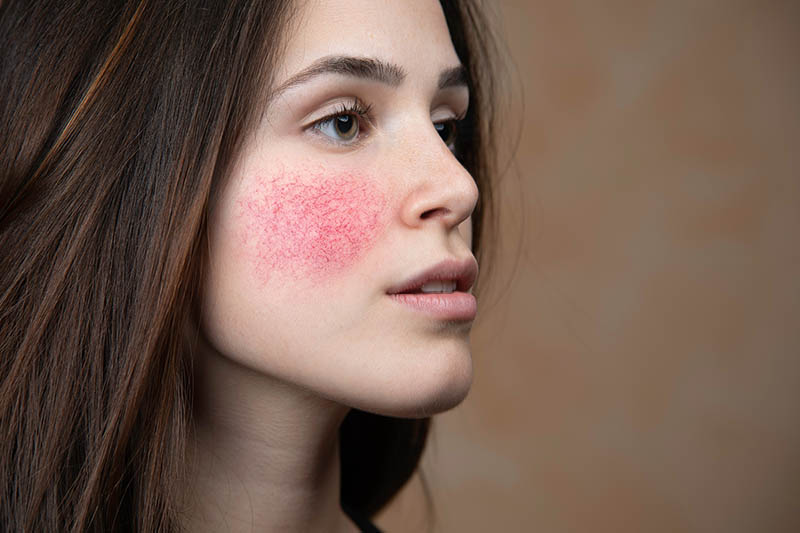Dos and Don’ts of Treating Sensitive Skin
Sensitive skin can cause discomfort and pain. Here are a few tips on how to combat it.

Dealing with skin sensitivity can be challenging, especially if you’re experiencing unpleasant side effects or conditions. Here are some dos and don’ts of treating sensitive skin as well as the signs and symptoms of this common condition.
What is sensitive skin?
Sensitive skin affects millions of people, but it’s not something that a doctor can diagnose. Rather, it refers to skin that is more prone to inflammation, which can have many different causes. It typically presents as feelings of burning, itching, tightness, or dryness, and may cause reddening of the skin’s appearance.
Skin sensitivity might occur as a reaction to certain fragrances, dyes, or chemicals that are present in products used topically. For some, skin sensitivity is triggered by external factors, such as air pollution, stress, alcohol use, hormonal fluctuations, temperature swings, and tobacco use. Sensitive skin can also be a symptom of an underlying medical condition or a side effect of a medication.
Related: Tips for Keeping Your Skin and Hair Healthy in the Winter
Is sensitive skin cause for concern?
In general, sensitive skin isn’t a particularly concerning condition, unless it causes more severe and/or uncomfortable reactions. Most people manage their sensitive skin on their own, simply by avoiding the use of certain products or ingredients.
If your skin gets dry, it may feel irritated or overly sensitive, so treating that condition can resolve the symptoms. Other potential causes of skin sensitivity include eczema, or atopic dermatitis, allergic contact dermatitis, irritant contact dermatitis, and rosacea.
Depending on the cause of skin sensitivity, a healthcare professional may prescribe treatments. Steroid creams can reduce itchiness and inflammation, although they’re generally not recommended for use on the face.
Numbing or analgesic creams can reduce the desire to itch inflamed or irritated skin, while sunscreen can protect sensitive skin from the harsh UV rays of the sun. If a skin issue is related to an allergic reaction, taking an oral antihistamine may lessen the effects.
Looking for a dermatologist to help with any skin issues? Select Health members can use the Find a Doctor tool to locate a nearby dermatologist or other healthcare providers.
Dos and don’ts of treating sensitive skin
When you’re trying to manage your sensitive skin, here are some of the dos and don’ts to protect it and reduce the risk of outbreaks and discomfort.
Do: Look at product labels
When you’re shopping for beauty products that will touch your skin, make sure to look at the labels. Certain ingredients might cause flare-ups or irritation, so it’s best to avoid them.
For people with naturally dry skin, avoiding products that contain alcohol is a good rule to follow. You can also look for products that are marketed to people with sensitive skin, although this labeling doesn’t necessarily guarantee that its ingredients are gentle.
Don’t: Soap up every inch of your body
Soap-suds are pretty harsh on the skin and lathering your soap or body wash can cause irritation and dryness. When choosing cleansing products, opt for those that contain gentle ingredients and are free from fragrances, deodorants, and dyes. Lather up the parts of your body that are prone to bacteria growth and odors, such as the armpits, feet, rear end, and groin, and use water for the rest of your body.
Do: Shorten your showers
Although water might seem like a natural source of hydration, prolonged exposure in the shower or bath can strip the skin of its natural oils, resulting in tightness and dryness. Take shorter showers and use warm water instead of hot. By shortening your showers, you can also reduce your water usage, so it’s a win-win.
Don’t: Overuse cosmetics
If you struggle with skin sensitivity, cosmetics can make the condition worse. But you don’t have to throw away your makeup. Instead, look for products that aren’t waterproof.
A thinner base layer, such as tinted moisturizer, is a better choice than a thick concealer or foundation that can clog your pores and cause irritation. Look for makeup products with the word “noncomedogenic” on the label, which means that it’s specially formulated to not clog up the pores.
With these tips, you can manage your sensitive skin while maintaining your hygiene and beauty routines. If you’re struggling with skin sensitivity that isn’t manageable on your own, consult with a dermatologist or another healthcare provider.
Related: Foods That Are Good for Your Skin
